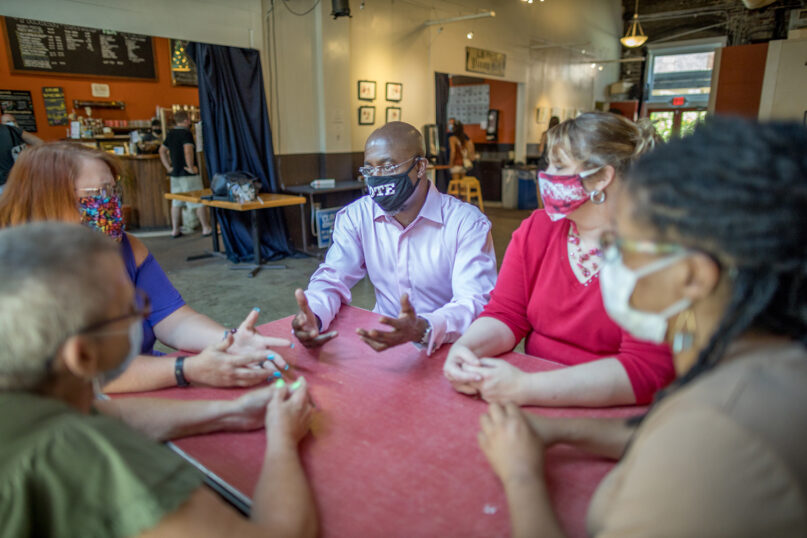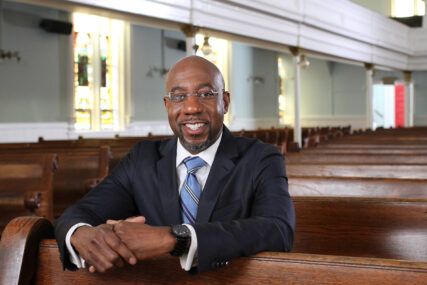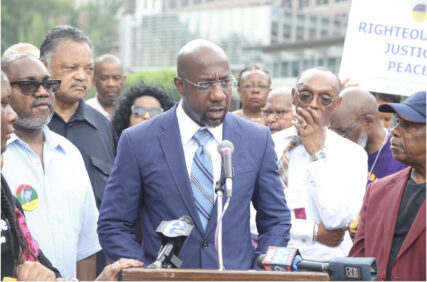Stephen Holmes
Thu, November 26, 2020
The Republican establishment, despite being unfairly advantaged by the skewed composition of the electoral college, by over-representation in the House due to partisan gerrymandering and in the Senate due to equal State suffrage, has been in no hurry to reject Donald Trump’s ludicrous allegation that the American electoral system is rigged to favor Democrats. Sweating the make-or-break Georgia runoffs, the party’s leaders are apparently frightened to cross the mad king, who owns their voters, lest he cause their ratings to plummet as he is doing with Fox News. But Republican complicity with this unprecedented attack on American democracy is not a matter of short-term expediency or fear of reprisals. It is much worse than that. Mitch McConnell and the others are not merely humoring the president until his mania subsides. Trump’s voters are the Republicans’ voters and the Republican party cannot easily cut them, and their deranged conspiracy theories, loose even after 20 January.
This has important implications for how Biden should respond to the incalculable damage Trump has inflicted on the country, including how his Department of Justice approaches the restoration of the rule of law.
The Republican party is deeply committed to the outrageously tilted playing field that allows a minority of voters to choose a majority of senators and, indirectly, a majority of supreme court justices, not to mention the occasional president as in 2000 and 2016. They are an unabashedly anti-democratic party in that sense alone, even if we set aside their brazen efforts at voter suppression and voter intimidation. This is perhaps the main reason why its leaders have proved so reluctant to dissociate themselves from Trump’s specious allegation that the 2020 presidential election was “rigged”. They know that the system is rigged. It is rigged to favor Republicans. And they relish not only the irony of Trump’s audacious reversal of the truth, but also the way it distracts attention from the genuinely unconscionable rigging that gives an American minority the power to impose its will on the American majority.
Republican officials are slowly distancing themselves from the embarrassingly delusional president’s refusal to accept the reality of his defeat. But the fact that it is taking them so long reflects a deep truth about the country’s politics, namely that Americans are still fighting the civil war. When Trump and his madcap surrogates cry “voter fraud”, they do not mean fraud in the technical sense of ballot stuffing or the miscounting of legal votes. What they mean is that Democrats have debased the composition of the electorate by making it easier for African Americans in Detroit, Atlanta, Philadelphia and Milwaukee, the most reliably Democratic voters in the country, to register and vote. Trump would have been elected in a landslide, they imply, if only “real Americans”, meaning exactly who you think, had been allowed to vote.
Nixon’s famous “southern strategy”, crafted with the support of Strom Thurmond, the infamous South Carolina segregationist, suffices to remind us that Republican pandering to white fears of demographic inundation did not begin, and will not end, with Donald Trump. Key to the historical origins of Republican acquiescence in Trump’s efforts to wreck American democracy is his last-ditch and doomed gambit to convince Republican controlled state legislatures in Wisconsin, Michigan and Pennsylvania to replace the pro-Biden delegates to their state’s electoral college with a pro-Trump slate of electors.
Trump’s advisers evidently believe that this anti-democratic maneuver is perfectly constitutional since article II, section 1, clause 2 of the US constitution declares that “each state shall appoint” presidential electors “in such manner as the legislature thereof may direct”. That clause seems straightforward enough until we recall, as Republicans are apparently loath to do, that the framers’ constitution was radically revised by the civil war amendments. In particular, section 2 of the 14th amendment of 1868 was designed to penalize any state that attempted to deny any American citizen “the right to vote at any election for the choice of electors for president and vice-president of the United States”. Allowing Republican-controlled state legislatures to appoint the electors would run grievously afoul of this all-important clause. It was bitterly contested in the states of the former Confederacy for the same reason that Trump’s diehard supporters are refusing to accept his defeat. Section 2 of the 14th amendment was seen at the time, and is apparently still seen today, as a betrayal of the racial solidarity of the white majority because crafted to reshape the American electorate by enfranchising African Americans. Shamelessly echoing the South’s post-civil war howls of betrayal, Trump shows why he should forever be remembered as the second president of the Confederacy.
While none of this implies that Joe Biden’s well-meaning appetite for some measure of bipartisanship is completely hopeless, it does suggest that he may be thinking about it in the wrong way. The Republican establishment, as mentioned, is panicked by the prospect of alienating Trump’s voters. But they also have strong reasons, after 20 January, to consign Trump himself to political oblivion. This is the wedge that the president-elect should exploit. After all, the presidential hopes of Nikki Haley, Marco Rubio, Ted Cruz and even Mike Pompeo depend on the current darling of their electorate being swept from the scene. And if his strident voice can be silenced, the party can hope to retreat into its pre-Trump habits of making only the kind of discreet appeals to white resentment acceptable in polite company.
Although Biden says that he wants to restore the rule of law that has been desecrated by the outgoing attorney general, William Barr, he may imagine that the best way to convince at least some Republicans to cooperate with his administration is to close the books on the past by directing his new justice department to let bygones be bygones. But attempting to “heal the soul of the nation” by discouraging a thorough inquiry into Trump’s potential violations of federal law recalls Robert Frost’s definition of a liberal as “a man who can’t take his own side in an argument”.
If retreat from confrontation is what Biden has in mind, he may be underestimating the tacit desire of the Republican leadership to rid themselves of the rabble-rouser who is keeping their electorate hostage. They may well silently but heartily approve if Biden keeps his promise to abstain from interfering with his new attorney general’s efforts to uncover the extent of Trump’s malfeasance in office. Even criminal prosecution, if it comes to that, might be an act of bipartisanship since, by publicly disgracing Trump, it would free a few more Republicans to be occasionally cooperative. This possibility should appeal to a president-elect who, with 80 million voters at his back, is not only willing to reach across the aisle but eager to take his own side’s side in an argument.
Stephen Holmes is professor of law at NYU School of Law and co-author with Ivan Krastev of The Light that Failed: A Reckoning (Penguin 2019)
This has important implications for how Biden should respond to the incalculable damage Trump has inflicted on the country, including how his Department of Justice approaches the restoration of the rule of law.
The Republican party is deeply committed to the outrageously tilted playing field that allows a minority of voters to choose a majority of senators and, indirectly, a majority of supreme court justices, not to mention the occasional president as in 2000 and 2016. They are an unabashedly anti-democratic party in that sense alone, even if we set aside their brazen efforts at voter suppression and voter intimidation. This is perhaps the main reason why its leaders have proved so reluctant to dissociate themselves from Trump’s specious allegation that the 2020 presidential election was “rigged”. They know that the system is rigged. It is rigged to favor Republicans. And they relish not only the irony of Trump’s audacious reversal of the truth, but also the way it distracts attention from the genuinely unconscionable rigging that gives an American minority the power to impose its will on the American majority.
Republican officials are slowly distancing themselves from the embarrassingly delusional president’s refusal to accept the reality of his defeat. But the fact that it is taking them so long reflects a deep truth about the country’s politics, namely that Americans are still fighting the civil war. When Trump and his madcap surrogates cry “voter fraud”, they do not mean fraud in the technical sense of ballot stuffing or the miscounting of legal votes. What they mean is that Democrats have debased the composition of the electorate by making it easier for African Americans in Detroit, Atlanta, Philadelphia and Milwaukee, the most reliably Democratic voters in the country, to register and vote. Trump would have been elected in a landslide, they imply, if only “real Americans”, meaning exactly who you think, had been allowed to vote.
Nixon’s famous “southern strategy”, crafted with the support of Strom Thurmond, the infamous South Carolina segregationist, suffices to remind us that Republican pandering to white fears of demographic inundation did not begin, and will not end, with Donald Trump. Key to the historical origins of Republican acquiescence in Trump’s efforts to wreck American democracy is his last-ditch and doomed gambit to convince Republican controlled state legislatures in Wisconsin, Michigan and Pennsylvania to replace the pro-Biden delegates to their state’s electoral college with a pro-Trump slate of electors.
Trump’s advisers evidently believe that this anti-democratic maneuver is perfectly constitutional since article II, section 1, clause 2 of the US constitution declares that “each state shall appoint” presidential electors “in such manner as the legislature thereof may direct”. That clause seems straightforward enough until we recall, as Republicans are apparently loath to do, that the framers’ constitution was radically revised by the civil war amendments. In particular, section 2 of the 14th amendment of 1868 was designed to penalize any state that attempted to deny any American citizen “the right to vote at any election for the choice of electors for president and vice-president of the United States”. Allowing Republican-controlled state legislatures to appoint the electors would run grievously afoul of this all-important clause. It was bitterly contested in the states of the former Confederacy for the same reason that Trump’s diehard supporters are refusing to accept his defeat. Section 2 of the 14th amendment was seen at the time, and is apparently still seen today, as a betrayal of the racial solidarity of the white majority because crafted to reshape the American electorate by enfranchising African Americans. Shamelessly echoing the South’s post-civil war howls of betrayal, Trump shows why he should forever be remembered as the second president of the Confederacy.
While none of this implies that Joe Biden’s well-meaning appetite for some measure of bipartisanship is completely hopeless, it does suggest that he may be thinking about it in the wrong way. The Republican establishment, as mentioned, is panicked by the prospect of alienating Trump’s voters. But they also have strong reasons, after 20 January, to consign Trump himself to political oblivion. This is the wedge that the president-elect should exploit. After all, the presidential hopes of Nikki Haley, Marco Rubio, Ted Cruz and even Mike Pompeo depend on the current darling of their electorate being swept from the scene. And if his strident voice can be silenced, the party can hope to retreat into its pre-Trump habits of making only the kind of discreet appeals to white resentment acceptable in polite company.
Although Biden says that he wants to restore the rule of law that has been desecrated by the outgoing attorney general, William Barr, he may imagine that the best way to convince at least some Republicans to cooperate with his administration is to close the books on the past by directing his new justice department to let bygones be bygones. But attempting to “heal the soul of the nation” by discouraging a thorough inquiry into Trump’s potential violations of federal law recalls Robert Frost’s definition of a liberal as “a man who can’t take his own side in an argument”.
If retreat from confrontation is what Biden has in mind, he may be underestimating the tacit desire of the Republican leadership to rid themselves of the rabble-rouser who is keeping their electorate hostage. They may well silently but heartily approve if Biden keeps his promise to abstain from interfering with his new attorney general’s efforts to uncover the extent of Trump’s malfeasance in office. Even criminal prosecution, if it comes to that, might be an act of bipartisanship since, by publicly disgracing Trump, it would free a few more Republicans to be occasionally cooperative. This possibility should appeal to a president-elect who, with 80 million voters at his back, is not only willing to reach across the aisle but eager to take his own side’s side in an argument.
Stephen Holmes is professor of law at NYU School of Law and co-author with Ivan Krastev of The Light that Failed: A Reckoning (Penguin 2019)


















